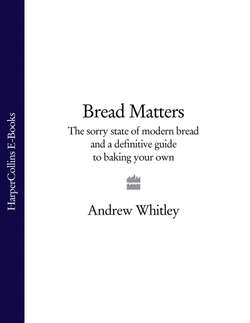Читать книгу Bread Matters: The sorry state of modern bread and a definitive guide to baking your own - Andrew Whitley - Страница 31
Slow is beautiful
ОглавлениеThere was a time when almost all breadmaking involved lactic acid bacteria and a long fermentation time. Before modern yeasts were isolated, most bread was fermented with what we would now call a sourdough and it would have taken many hours to rise. It is an intriguing possibility that, even if the wheats our forefathers cultivated contained the same potentially harmful gliadins as modern varieties, they were largely neutralised by the lactic acid bacteria that bakers couldn’t help developing in their doughs.
Coeliac disease was identified only in the 1950s. In its severest form, it is a seriously debilitating condition unless treated by total avoidance of gluten. If such a disease had existed from our earliest wheat-eating days, is it not likely that sufferers, not knowing the cause or not having enough other food to eat, would have fared rather badly in the evolutionary stakes? Yet it seems that a good many of their genes have survived. A more plausible explanation might be that it was a combination of changes in wheat itself and a move to fast fermentation using commercial yeast and little or no natural lactic acid bacteria that rendered bread indigestible to certain individuals who may, granted, have had some genetic predisposition against gluten.
Could there be a connection between the Irish tradition of making bread without any fermentation at all (it is aerated with bicarbonate of soda) and the high incidence of coeliac disease in that country?
Whatever the outcome of detailed research into the exact mechanisms of cereal intolerance, it is abundantly clear that we have evolved an industrial breadmaking system that, in a variety of ways we can no longer ignore, produces bread that more and more people cannot and should not eat.
